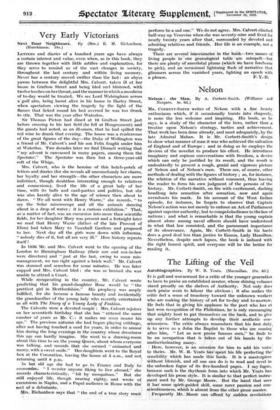Nelson
MR. Connwrr-SMITH writes of Nelson with a fine hearty enthusiasm which, if it occasionally bursts into rhapsody, is none the less welcome and inspiring. His book, as he says, is a study of the character of the hero, rather than a treatise upon Nelson's strategy, tactics and achievement. That work has been done already, and most adequately, by the late Admiral Mahan. It is Mr. Corbett-Smith's design to show what manner of man it was who achieved the salvation of England and of Europe ; and in doing so he employs the devices of the novelist to produce his effect. He introduces imaginary and copious conversations with freedom, a device which can only be justified by its result, and the result is undoubtedly to present a rough, genial and vigorous picture of Nelson and of Nelson's men. There are, of course, other methods of dealing with the figures of history ; as, for instance, the relation of the narrative without comment, thus leaving the reader to form his own judgment of the persons of the history. Mr. Corbett-Smith, on fire with excitement, dashing headlong into sensation after sensation, now and again overshoots his mark. In his account of the West Indian episode, for instance, he forgets to observe- that Captain Nelson's action was not merely to enforce an Act of Parliament against superior authority, but to compel obedience to the law of nations ; and what is remarkable is that the young captain almost alone among naval officers should have .understood in what that law consisted, and the paramount importance of its observance. Again, Mr. Corbett-Smith in his haste does a good deal less than justice to Minna, Lady Hamilton.' Nevertheless, despite such lapses, the book is imbued with the right honest spirit, and everyone will be the better for reading it.






























































 Previous page
Previous page